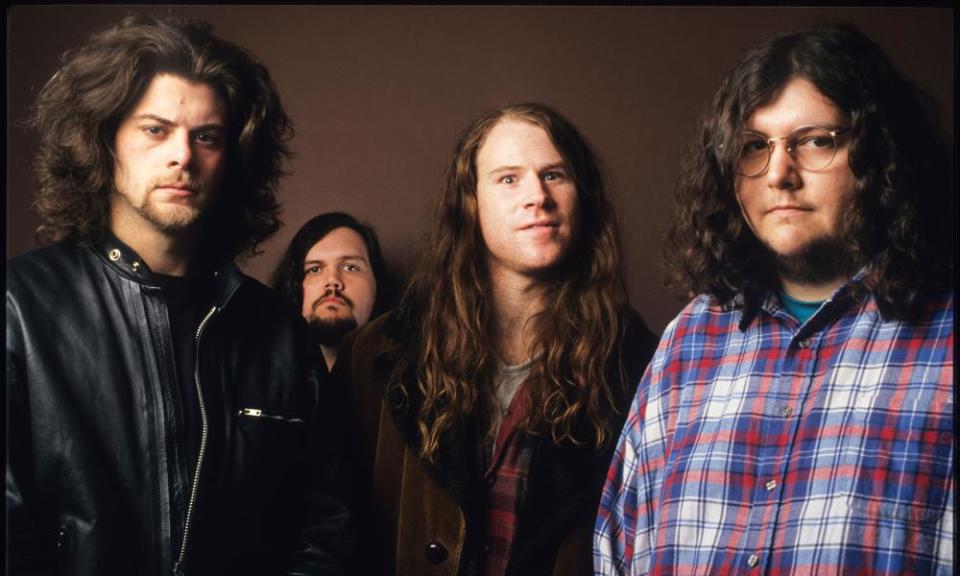Mark Lanegan obituary

The death of Mark Lanegan, the former vocalist with the bands Screaming Trees and Queens of the Stone Age, at the age of 57, feels painfully premature, but he had been walking a tightrope for most of his life. Last year, Covid-19 rendered him deaf, unable to walk and frequently comatose; he wrote a terrifying account of the experience in Devil in a Coma (2021). As a teenager he had numerous brushes with the law for drug and alcohol offences. A notorious drunk by the time he was 12, he admitted that he had started taking heroin as a way to beat his alcohol problem.
At 20, he was run over by a tractor; the accident came just as he was preparing to leave his native Washington state and head for Las Vegas. Instead of going to Nevada, he ended up joining the prototype grunge band Screaming Trees, which set him off on his musical career. Despite releasing a string of frequently impressive albums, which helped establish Lanegan as an expressive singer blessed with a rich and dark array of vocal tones, the group were handicapped by violent personality clashes, and never hit the commercial heights enjoyed by contemporaries such as Nirvana or Soundgarden.
By the time Screaming Trees called it quits in 2000, Lanegan was already four albums into a solo career. This had begun in 1990 when he released The Winding Sheet, a brooding and downbeat set of songs typified by his doomy version of Lead Belly’s Where Did You Sleep Last Night. This featured Nirvana’s Kurt Cobain on guitar, and the song also entered Nirvana’s repertoire. All of the dozen solo discs he released over a 30-year period had much to offer in different ways, helping to affirm Lanegan’s status as a writer and performer who was compared to such idiosyncratic artists as Leonard Cohen and Nick Cave.

He was born in Ellensburg, Washington, a small town 130 miles from Seattle, where the local industries were logging and farming. His parents, Dale and Floy, were both teachers. He recalled listening to albums by the country artists Johnny Cash, George Jones and Willie Nelson in the family home, as well as Frank Sinatra and Andy Williams, but he suffered an abusive upbringing which prompted him to take refuge in drink and narcotics.
In a 2019 interview for the Come to Where I’m From podcast, he described how different branches of his family were Catholic, Jehovah’s Witnesses and “some religious cult that doesn’t even have a name”, from which he had concluded that “organised religion for me is just so much bullshit.” He recalled the time when his father retreated to a cabin in the Cascade mountains to live a hermit’s life.
At Ellensburg high school, as well as soaking up punk records by bands such as the Damned and the Sex Pistols, he became friendly with Van Conner, whose family gave him a job repossessing electrical goods from customers behind on their payments. Van invited Lanegan to play drums in the band he had formed with his brother Gary Lee Conner, but since he proved to be a far better singer than drummer, Mark Pickerel took over the drum stool while Lanegan moved to lead vocals.
Thus Screaming Trees were formed in 1984, and they released their debut album, Clairvoyance, in 1986. The band built a following on the indie circuit with their raw, punk-charged songs, but it was not until 1992 that they broke through to a wide audience when their song Nearly Lost You was used in the movie Singles and became a hit on the US alternative airplay and mainstream rock charts. This was from their sixth album, Sweet Oblivion, with Screaming Trees now signed to Epic, having been with the independent label SST.

They enjoyed more success with the single Dollar Bill, while their final album, Dust (1996), reached the Top 40 in the UK and produced a hit single with All I Know. The band by now had matured way beyond their ragged garage-band beginnings, though the strings, acoustic guitar and harmonies on the anthemic song Sworn and Broken might have sounded alarmingly mainstream for some fans.
Lanegan’s stint with Queens of the Stone Age began after he struck up a friendship with the band’s founder, Josh Homme, while he toured with Screaming Trees as an extra guitarist. Lanegan was a permanent member for a time, then enjoyed a friendly arrangement as a part-time contributor. This eventually ended by mutual consent. “It was too easy,” Lanegan confessed. “I needed to do something else.”
It was with Homme that Lanegan wrote the theme song for the TV chef Anthony Bourdain’s show Anthony Bourdain: Parts Unknown. Bourdain’s suicide in 2018 was particularly grim for Lanegan, who had already been scarred by Cobain’s suicide and the drug-overdose death of another close friend, Layne Staley of the Seattle band Alice in Chains. Lanegan and Staley (along with Pearl Jam’s Mike McCready) had been members of the grunge supergroup Mad Season, who released the album Above (1995).
Lanegan enjoyed successful collaborations with numerous artists, but fared especially well in his partnership with Isobel Campbell (formerly of Belle & Sebastian). They made three albums together, one of them, Ballad of the Broken Seas (2006), earning a Mercury prize nomination. He formed the Gutter Twins with Greg Dulli, and released the album Saturnalia (2008). Dulli described the collaboration as “the Satanic Everly Brothers”.
Lanegan was also developing a successful career as an author. He exhibited his gifts as a poet in Plague Poems (2020, with Wesley Eisold) and Leaving California (2021), while the autobiographical memoir Sing Backwards and Weep (2020), a horrifying odyssey of addiction and dysfunction, earned lavish praise from readers and critics.
At the time of his death, Lanegan was living in Killarney, County Kerry, with his second wife, Shelley Brien, who survives him. His first marriage, to Wendy Rae Fowler, ended in divorce.
• Mark William Lanegan, singer, songwriter and author, born 25 November 1964; died 22 February 2022

 Yahoo News
Yahoo News 
